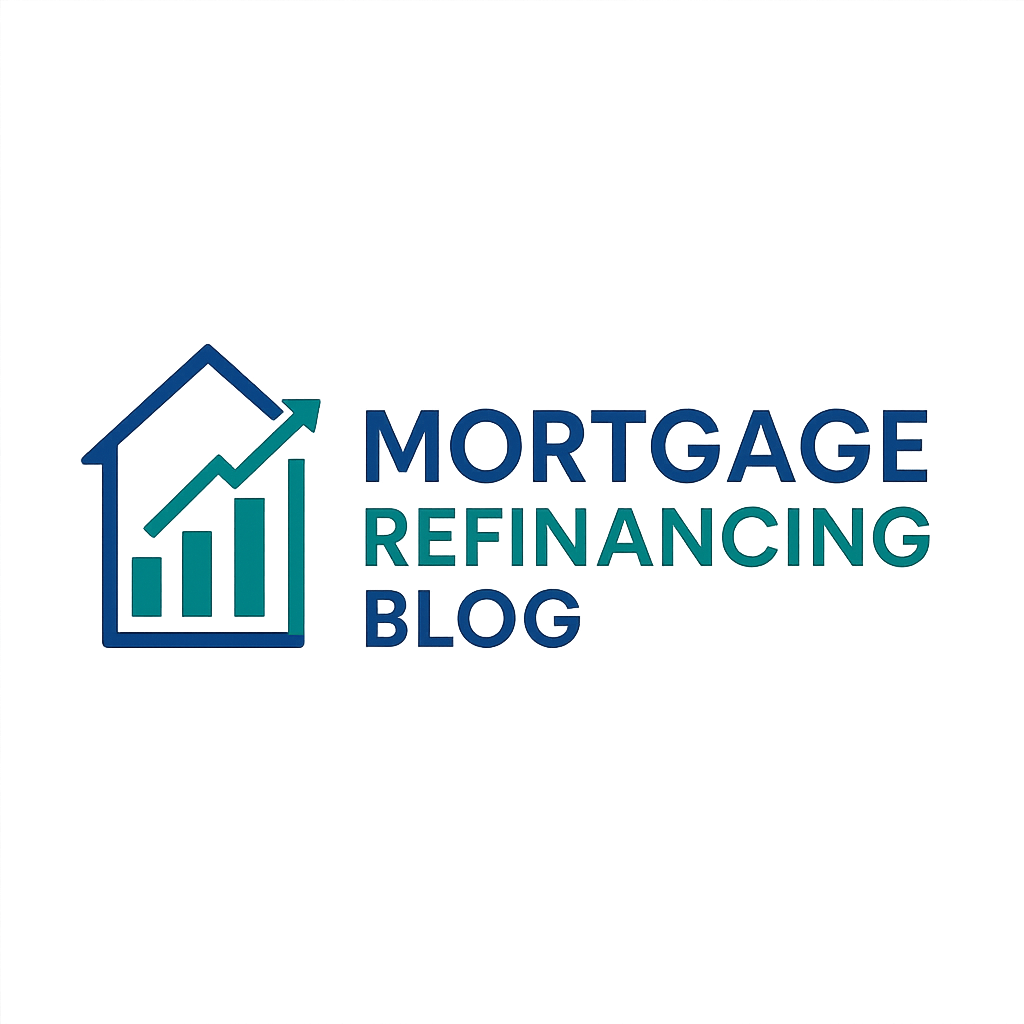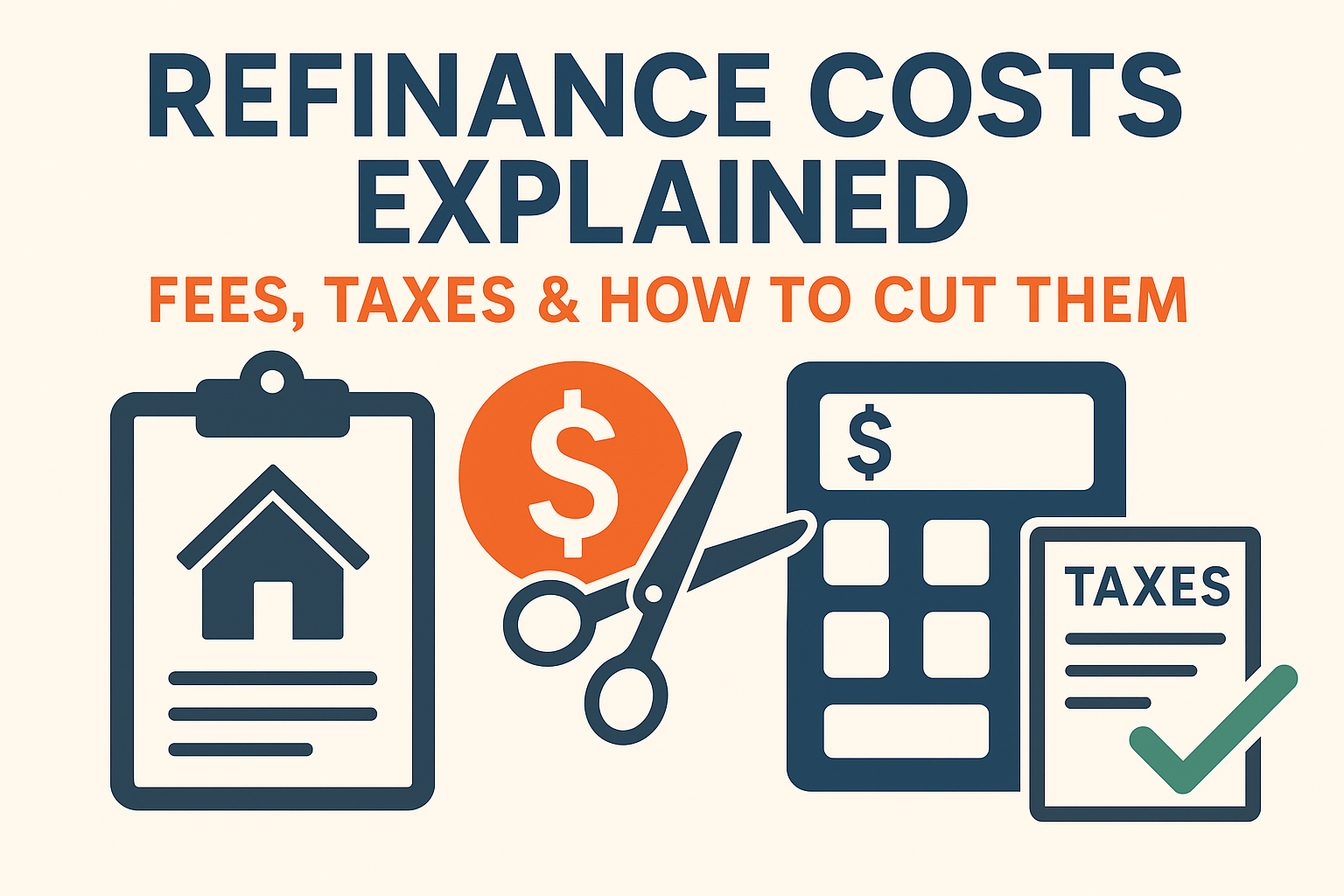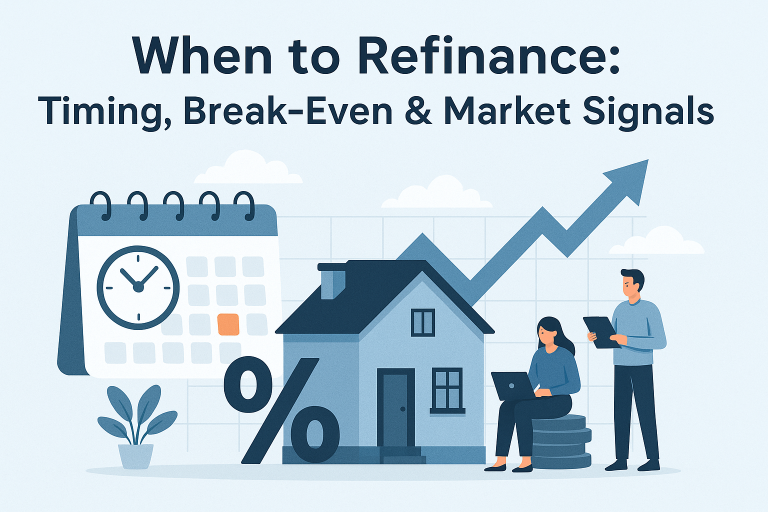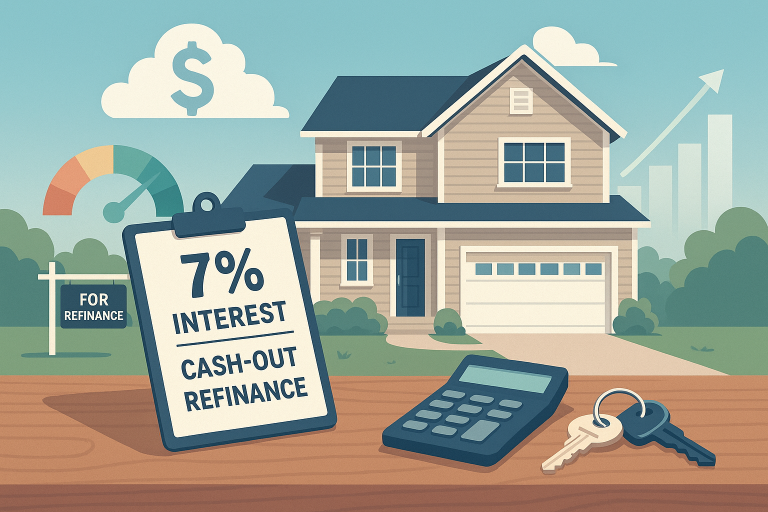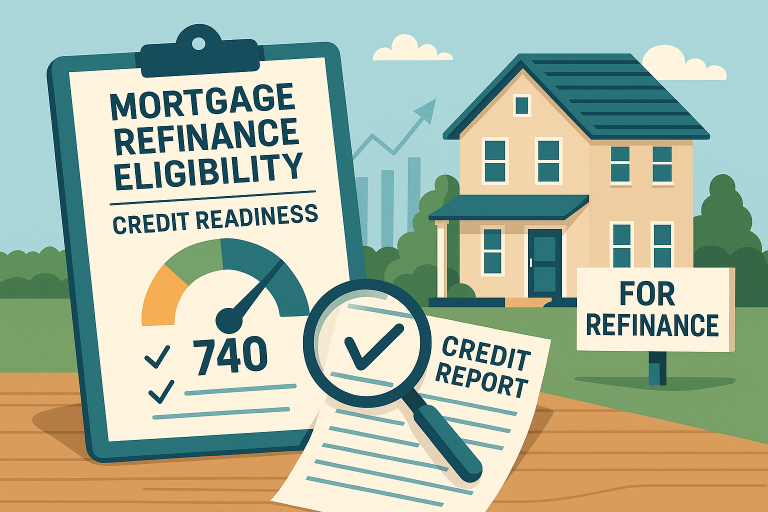Refinance Costs Explained: Fees, Taxes & How to Cut Them
Hidden Fees Can Derail Your Savings
Refinancing appears straightforward until you encounter the maze of hidden fees that can consume your anticipated savings. While lenders advertise competitive rates, the true cost lies in origination fees, third-party charges, and obscure administrative costs that aren’t immediately apparent. Recent industry data shows closing costs averaging 2-6% of loan amounts, meaning a $300,000 refinance could cost $6,000-$18,000 in fees alone[1]. Many homeowners discover surprise charges like “document preparation fees,” “funding fees,” and “wire transfer costs” that weren’t disclosed upfront. Understanding these costs—and knowing which ones you can negotiate or eliminate—is essential for protecting your refinancing benefits and ensuring the transaction delivers genuine financial value.
Complete Cost Checklist
Lender-Imposed Fees
Origination Fees represent the primary lender charge, typically 1-1.5% of the loan amount. This fee covers loan processing, underwriting, and administrative costs. Some lenders waive origination fees but compensate with higher interest rates.
Discount Points are optional fees paid to reduce your interest rate. Each point costs 1% of the loan amount and typically reduces your rate by 0.25%. Points make sense if you plan to stay in your home long enough to recoup the cost through lower monthly payments.
Application and Processing Fees range from $75-$500 and cover initial loan processing. These fees are often negotiable, especially with online lenders competing for business.
Underwriting Fees of $400-$900 cover the cost of evaluating your loan application. Some lenders include this in their origination fee, while others charge separately.
Third-Party Service Costs
Appraisal Fees typically cost $400-$600 for standard properties, though complex or luxury homes may require higher fees. Some lenders offer appraisal waivers for refinances with low loan-to-value ratios.
Title Insurance and Search protects against ownership disputes and typically costs $500-$1,500 depending on property value and state requirements. Some states allow you to receive discounts for recent title policies.
Attorney or Settlement Fees range from $500-$1,500 in states requiring attorney involvement in closings. These fees cover legal document preparation and closing coordination.
Survey Costs may be required if property boundaries are unclear, typically costing $300-$800. Many lenders waive survey requirements for refinances.
Government and Recording Fees
Recording Fees charged by local governments range from $50-$500 to officially record your new mortgage. These fees vary significantly by location and property value.
Tax Service Fees of $75-$150 help lenders monitor property tax payments to ensure taxes remain current.
Flood Certification costs $15-$50 to verify whether your property is in a flood zone, determining flood insurance requirements.
Average Closing Costs in 2025
National Cost Ranges
Current market data indicates refinancing closing costs typically range from 2-6% of the loan amount, with most homeowners paying around 3-4%[2]. For a $300,000 refinance, this translates to $9,000-$12,000 in total costs.
Regional Variations:
- High-Cost Areas (California, New York, Hawaii): 4-6% of loan amount
- Moderate-Cost Areas (Texas, Florida, North Carolina): 3-4% of loan amount
- Low-Cost Areas (Midwest, South): 2-3% of loan amount
Loan Amount Impact
Closing costs don’t scale linearly with loan amounts. Smaller loans often have higher percentage costs due to fixed fees, while larger loans benefit from economies of scale.
$200,000 Loan: $6,000-$10,000 (3-5%) $300,000 Loan: $9,000-$15,000 (3-5%) $500,000 Loan: $12,000-$20,000 (2.4-4%) $750,000 Loan: $15,000-$25,000 (2-3.3%)
2025 Market Factors
Rising interest rates have increased some costs while competitive pressure has reduced others. Lenders are waiving more fees to attract refinancing business, but third-party service costs continue rising with inflation.
Recent data shows closing costs as a percentage of loan amounts averaging 0.72% with a median of 0.65%[3]. This represents a slight decrease from 2024 levels as lenders compete more aggressively for refinancing business.
Government & State Taxes/Stamp Duty
Federal Tax Considerations
The IRS allows deduction of mortgage interest and certain real estate taxes paid at closing. However, most closing costs aren’t immediately deductible but may be added to your property’s cost basis for future capital gains calculations.
Points Deductibility: Discount points paid to reduce interest rates are generally deductible in the year paid, providing immediate tax benefits for homeowners who itemize deductions.
Prepaid Interest: Interest paid from closing to the end of the month is deductible in the current tax year.
State Transfer Taxes
Transfer taxes vary dramatically by state and can significantly impact refinancing costs:
California: $1.10 per $1,000 of loan amount[4] Delaware: Approximately 4% of loan amount[5] Florida: $0.70 per $100 of loan amount New York: $2.05 per $500 of loan amount plus additional local taxes Texas: No state transfer tax Maryland: 0.5% of loan amount[6]
Recordation and Stamp Taxes
Some states impose recordation or stamp taxes on refinanced mortgages:
Maryland: 0.5% state recordation tax plus local taxes Virginia: $0.25 per $100 of loan amount Washington D.C.: $5.75 per $1,000 of loan amount
Important Note: Most transfer taxes do NOT apply to refinances, only to property sales. However, recordation taxes for registering the new mortgage typically do apply[7].
Junk Fees to Challenge
Questionable Administrative Charges
Document Preparation Fees ($100-$500): Lenders charge for preparing loan documents, but this is part of standard loan processing and often negotiable.
Funding or Wire Transfer Fees ($25-$100): Costs for electronically transferring loan funds, though many lenders absorb these costs.
Courier Fees ($25-$75): Charges for document delivery, often inflated compared to actual costs.
Administrative or Processing Fees ($200-$800): Vague charges that duplicate other fees and are frequently negotiable.
Inflated Service Charges
Credit Report Fees above $50: Lenders typically pay $10-$25 for credit reports but may charge borrowers significantly more.
Tax Service Fees above $100: Monitoring property taxes shouldn’t cost more than $75-$100.
Excessive Underwriting Fees: Some lenders charge $1,000+ for underwriting when $400-$600 is more reasonable.
Eliminated or Reduced Fees
Application Fees: Many online lenders have eliminated these entirely to remain competitive.
Rate Lock Fees: Standard 30-45 day rate locks should be free, with fees only for extended periods.
Duplicate Title Charges: Ensure you’re not paying for both owner’s and lender’s title insurance if you recently purchased or refinanced.
No-Closing-Cost Loans Explained
How They Work
No-closing-cost refinancing eliminates upfront fees by either rolling costs into the loan amount or accepting a higher interest rate. The lender covers closing costs in exchange for either increased loan balance or higher monthly payments.
Rate Increase Method: Lenders offer 0.25-0.5% higher interest rates to cover closing costs. This approach maintains your current loan balance but increases monthly payments.
Rolled-In Costs Method: Closing costs are added to your loan amount, maintaining your interest rate but increasing your total debt.
When They Make Sense
Short-Term Ownership: If you plan to move or refinance again within 5 years, no-closing-cost loans can be advantageous.
Cash Flow Constraints: Homeowners who can’t afford upfront costs but benefit from lower rates or cash-out access.
Minimal Rate Reduction: When rate improvements are small (0.5% or less), no-closing-cost options may provide better overall value.
Cost-Benefit Analysis
For a $300,000 refinance with $9,000 closing costs:
Traditional Refinance: 6.5% rate, $9,000 upfront costs No-Closing-Cost Option: 6.75% rate, $0 upfront costs
Monthly Payment Difference: $95 higher with no-closing-cost option Break-Even Point: 95 months (nearly 8 years)
This analysis shows no-closing-cost loans benefit homeowners planning to move within 8 years.
Negotiation Tactics & Scripts
Pre-Application Strategies
Shop Multiple Lenders: Obtain loan estimates from at least three lenders to identify competitive baseline costs.
Timing Leverage: Apply when lenders are competing for business, typically during slower market periods.
Relationship Banking: Use existing banking relationships to negotiate better terms and reduced fees.
Effective Negotiation Scripts
For Origination Fees: “I’ve received quotes from other lenders with no origination fees. Can you match this or reduce your fee to remain competitive?”
For Administrative Fees: “I see a $400 processing fee that wasn’t mentioned initially. This seems to duplicate your origination fee. Can you waive this charge?”
For Third-Party Services: “Your appraisal fee is $200 higher than other lenders quoted. Can you use a different appraiser or reduce this fee?”
For Rate Improvements: “Lender X offered the same rate with $500 lower closing costs. What can you do to match or improve this offer?”
Timing Your Negotiations
After Initial Approval: Once approved, you have leverage to negotiate fees without risking qualification.
Before Rate Lock: Use multiple loan estimates to negotiate better terms before committing to a rate lock.
During Underwriting: Address surprise fees immediately, as lenders are motivated to complete approved transactions.
Case Study: Fee Savings Success
Background
Jennifer, a marketing manager from Phoenix, sought to refinance her $350,000 mortgage from 7.2% to 6.5%. Her initial loan estimate showed $11,200 in closing costs.
Original Fee Breakdown
- Origination Fee: $3,500 (1%)
- Appraisal: $550
- Title Insurance: $1,800
- Attorney Fees: $800
- Underwriting: $695
- Various Administrative Fees: $1,200
- Recording and Taxes: $400
- Prepaid Interest and Escrow: $2,255
Negotiation Strategy
Jennifer obtained quotes from four lenders and used competitive pressure to reduce fees:
Origination Fee Reduction: Negotiated from 1% to 0.5% ($1,750 savings) Administrative Fee Elimination: Removed $400 “document prep” and $300 “funding” fees Title Insurance Discount: Used reissue rate for 40% discount ($720 savings) Attorney Fee Negotiation: Reduced from $800 to $500
Final Results
Original Closing Costs: $11,200 Negotiated Closing Costs: $7,975 Total Savings: $3,225 (29% reduction)
The negotiations extended her break-even period by only 3 months while saving over $3,000 in upfront costs.
Key Takeaways
Understanding refinancing costs requires examining both obvious and hidden fees that can significantly impact your savings. While closing costs average 2-6% of loan amounts, strategic negotiation can reduce these costs by 20-40% in many cases.
Focus your negotiation efforts on the largest fees first: origination fees, administrative charges, and third-party service costs. Many fees are negotiable, especially when you have competing offers from multiple lenders.
No-closing-cost refinancing can be valuable for homeowners planning to move within 5-7 years, but carefully analyze the long-term cost implications of higher rates or increased loan balances.
State and local taxes add complexity to closing costs, but most transfer taxes don’t apply to refinances—only recordation taxes for registering the new mortgage.
The key to minimizing refinancing costs is preparation, comparison shopping, and confident negotiation. Lenders expect some fee discussion and often have flexibility to adjust costs to win your business.
Refinancing Cost Breakdown Table
| Cost Item | Average Cost | Negotiable? | Notes |
|---|---|---|---|
| Origination Fee | $3,000-$4,500 | Yes | Often 1-1.5% of loan amount |
| Appraisal | $400-$600 | Sometimes | May be waived for low LTV |
| Title Insurance | $500-$1,500 | Yes | Reissue rates available |
| Attorney/Settlement | $500-$1,500 | Yes | Required in some states |
| Underwriting | $400-$900 | Yes | Sometimes included in origination |
| Credit Report | $25-$100 | Yes | Should not exceed $50 |
| Tax Service | $75-$150 | Yes | Monitors property tax payments |
| Flood Certification | $15-$50 | No | Government requirement |
| Recording Fees | $50-$500 | No | Government charges |
| Document Prep | $100-$500 | Yes | Often eliminable junk fee |
| Wire Transfer | $25-$100 | Yes | Many lenders absorb this |
| Rate Lock Extension | $200-$500 | Yes | Standard locks should be free |
Answer Engine Snapshot
Essential Refinancing Cost Facts:
• Average closing costs: 2-6% of loan amount, typically $9,000-$12,000 for $300,000 loan • Biggest negotiable fees: Origination fees (1-1.5%), administrative charges ($200-$800), title insurance (40% reissue discounts) • Most common junk fees: Document preparation ($100-$500), excessive credit report fees (over $50), duplicate processing charges • No-closing-cost loans: Trade higher rates (0.25-0.5%) for $0 upfront costs, beneficial if moving within 5-7 years • State transfer taxes: Don’t apply to refinances, but recordation taxes (0.25-0.5%) do apply • Best negotiation timing: After approval but before rate lock, using multiple competing offers • Tax implications: Points are deductible, most other costs aren’t immediately deductible but may affect capital gains basis
Frequently Asked Questions
Q: What are the typical closing costs for refinancing? A: Refinancing closing costs typically range from 2-6% of your loan amount. For a $300,000 loan, expect $6,000-$18,000 in total costs, with most homeowners paying around $9,000-$12,000.
Q: Which refinancing fees are negotiable? A: Most fees are negotiable, especially origination fees (1-1.5%), administrative charges, underwriting fees, and third-party service costs. Government fees like recording charges are typically non-negotiable.
Q: Are no-closing-cost refinances worth it? A: No-closing-cost refinances work best if you plan to move within 5-7 years. You’ll pay higher interest rates (0.25-0.5% more) instead of upfront costs, so calculate the break-even point carefully.
Q: Do I pay transfer taxes when refinancing? A: Most state transfer taxes don’t apply to refinances, only property sales. However, you typically pay recordation taxes (0.25-0.5% of loan amount) to register the new mortgage.
Q: What are junk fees and how do I avoid them? A: Junk fees are unnecessary charges like document preparation fees, excessive credit report fees, and duplicate processing charges. Challenge any fee above market rates or that seems to duplicate other charges.
Q: Can I negotiate refinancing costs after approval? A: Yes, the best time to negotiate is after approval but before rate lock. Use competing offers from other lenders to leverage better terms and reduced fees.
